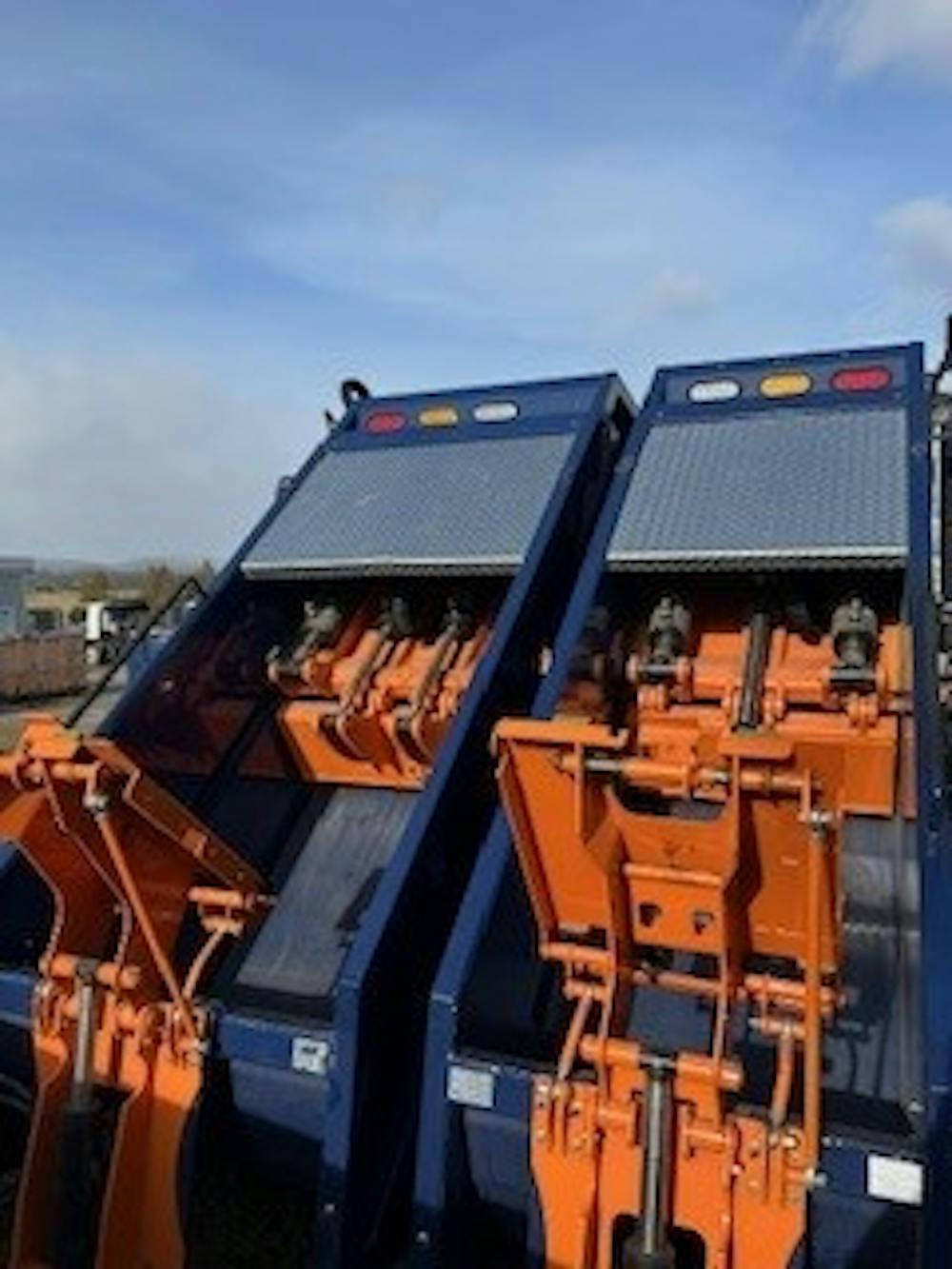This semester, Talking Trash has detailed Middlebury’s food waste and recycling processes. This time, we’re investigating what happens to the waste that is not recycled or composted: landfill trash.
In 2023, Middlebury sent 943,520 pounds of waste to the landfill, which accounted for 40% of the college’s total waste, according to Kim Bickham, supervisor for waste management and custodian. Bickham said the college has robust systems in place to divert trash from landfills so that even less of Middlebury’s total waste is thrown away. Improper sorting of waste, however, risks sending compostable or recyclable waste to the trash, ultimately overburdens landfills.
Garbage trucks travel across campus about 10 times a month to collect waste bags from the trash and recycling bins on campus and bring them to the Recycling Center. At the Recycling Center, facilities and custodial staff perform cursory checks of each bag to look for ‘co-mingled’ bags, those that appear to include both trash and recycling, which Bickham said must be thrown out as trash. Middlebury’s Recycling Center no longer sorts recycling and trash, placing the responsibility of sorting on the disposers themselves — namely students, faculty and staff.
A common occurrence, according to Doug Smith, facilities team liaison for waste management, is someone throwing a container with liquid into the recycling, which then contaminates the entire bag and requires it to be sent to the landfill.
The list of materials that constitute true trash in Vermont is short. According to Middlebury’s Recycling and Waste Management website, trash includes food wrappers, tissues, paper cups, paper plates, label sheets, carbon paper, aluminum lined paper, styrofoam, empty motor oil containers, paper towels, hygiene products and plastic grocery bags. Most other waste belongs in recycling or compost bins.
“Really, the majority of the trash that we get are paper towels, Kleenexes, like bathroom trash,” Bickham said. “That's really it — that's all we really should be producing.”
Bickham described the decision-making process of sending a bag to the landfill or recycling and how the process has been complicated since the pandemic.
“The deciding factor is how many paper towels and Kleenex are in something,” Bickham said. “Even if it is in a clean bag of recycling, we have to throw that away, because after Covid it was stated that we would not open any bags that contain paper towels and Kleenex.”
Improperly sorted waste can be problematic in a few ways. First, Middlebury is fined by the Addison County Transfer station if employees there find toxic waste — such as biohazard containers, fluorescent light bulbs or paint — in its trash. If hazardous waste ends up in the landfill, toxic chemicals and fumes can leach into nearby air and water. Fines can also be imposed when large amounts of contaminated recycling are delivered as recycling to the transfer station. Middlebury is not fined when compost ends up in the landfill, but Bickham explained the justification to keep compost and hazardous waste out of landfills.
“An important reason for keeping compost out of the trash is the gasses that it kicks off,” she said. “Important reasons for keeping the batteries and the light bulbs and that stuff out is because you're putting toxins into the landfill, and that leaches into the soil.”
Once trash reaches Addison County Transfer Station on Vermont Route 7, trucks carry the trash to the state’s only landfill in Coventry, Vt. The 130-acre Coventry Landfill is owned by Casella Waste Systems, which operates nine landfills across the Northeast. Casella added 50 acres to the landfill in 2021, and it plans to build three more cells of similar sizes over the next 20 years, but Vermont has no further plans for its waste after that.
Vermont’s efforts to reduce waste include The Materials Management Plan, which is published every five years, and the Universal Food Scraps Recycling Law of 2020. These initiatives have shown mixed results — the waste diverted increased slightly after 2020, but the landfill waste load has increased over the past decade.
On the bright side, Facilities Services continues to search for ways to divert trash from the landfill despite staffing shortages. The Recycling Center will begin using a newly-acquired split-back truck in February, which Bickham hopes will increase efficiency for waste management. The truck will have two sides, one for trash and one for recycling, as opposed to the current truck which has one area for all collected bags. The truck will eventually eliminate the need to use bags for recycling — instead, items will be taken straight from bins and dumped into the truck.
In any case, the importance of separating waste from the very beginning of the process is clear, but ensuring proper separation relies on education on how to properly dispose of waste, according to Bickham. Facilities Services will conduct a training on these practices with staff in the Human Resources Office in December.
With facilities having launched its own efforts to train the community on proper waste disposal, Smith and Bickham hope that students, staff and faculty will take their own steps to become educated about what belongs in each waste bin for the betterment of the college, Vermont and beyond.

Maggie Bryan '25 (she/her) is the Senior News Editor.
Maggie is a senior at Middlebury, majoring in Environmental Policy and French. She previously held roles as Senior Arts and Culture Editor, Arts and Culture Editor, and Staff. During her free time, she loves running, listening to live music, drinking coffee, and teaching spin classes. She is from Chapel Hill, North Carolina.




